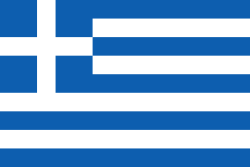| Greece at the 2016 Winter Youth Olympics | |
|---|---|
 | |
| IOC code | GRE |
| NOC | Hellenic Olympic Committee |
| Website | www |
| in Lillehammer | |
| Competitors | 3 in 3 sports |
| Medals |
|
| Winter Youth Olympics appearances | |
Greece competed at the 2016 Winter Youth Olympics in Lillehammer, Norway from 12 to 21 February 2016.